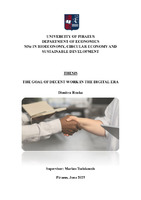| dc.contributor.advisor | Tselekounis, Markos | |
| dc.contributor.advisor | Τσελεκούνης, Μάρκος | |
| dc.contributor.author | Rouka, Dimitra | |
| dc.contributor.author | Ρούκα, Δήμητρα | |
| dc.date.accessioned | 2025-07-01T14:30:36Z | |
| dc.date.available | 2025-07-01T14:30:36Z | |
| dc.date.issued | 2025-06 | |
| dc.identifier.uri | https://dione.lib.unipi.gr/xmlui/handle/unipi/17895 | |
| dc.description.abstract | Η ψηφιακή εποχή αναδιαμορφώνει θεμελιωδώς τον κόσμο της εργασίας, εγείροντας κρίσιμα ερωτήματα σχετικά με την ασφάλεια της απασχόλησης, τα εργασιακά δικαιώματα και την ένταξη. Η παρούσα εργασία εξετάζει αυτές τις μεταμορφώσεις μέσα από το πλαίσιο του Στόχου Βιώσιμης Ανάπτυξης 8 (ΣΒΑ 8), ο οποίος προάγει την αξιοπρεπή εργασία και την οικονομική ανάπτυξη. Καθώς η αυτοματοποίηση, η τεχνητή νοημοσύνη και η οικονομία της πλατφόρμας επαναπροσδιορίζουν τις παραδοσιακές δομές απασχόλησης, αναδύεται ένα βασικό ερώτημα: Χάνουμε τις δουλειές μας; Η μελέτη εξετάζει τόσο τους κινδύνους απώλειας θέσεων εργασίας όσο και τις νέες ευκαιρίες που δημιουργεί η ψηφιοποίηση, τονίζοντας την ανάγκη για πολιτικές που διασφαλίζουν δίκαιες συνθήκες εργασίας στη μεταβαλλόμενη αγορά εργασίας.
Η έρευνα εξετάζει επίσης τον ρόλο των κοινωνικών ομάδων στο χώρο εργασίας, τον αντίκτυπο της αλγοριθμικής διαχείρισης και το διευρυνόμενο χάσμα στις ψηφιακές δεξιότητες. Αντιμέτωπη με αυτές τις προκλήσεις, υπογραμμίζει τη σημασία της ψηφιακής ένταξης, της επαγγελματικής κατάρτισης και της εταιρικής κοινωνικής ευθύνης για την προώθηση μιας δίκαιης και ισότιμης αγοράς εργασίας. Επιπλέον, αξιολογεί την αποτελεσματικότητα των υφιστάμενων πολιτικών και ρυθμιστικών πλαισίων, θέτοντας το ερώτημα κατά πόσον μπορούν να προστατεύσουν επαρκώς τα δικαιώματα των εργαζομένων απέναντι στις ταχείες τεχνολογικές αλλαγές.
Πέρα από τις προκλήσεις αυτές, η εργασία εξετάζει και τη περιβαλλοντική διάσταση της ψηφιοποίησης, συμπεριλαμβανομένου του δυναμικού της να υποστηρίξει τη βιωσιμότητα. Αναλύει επίσης μελέτες περιπτώσεων εταιρειών που έχουν εφαρμόσει με επιτυχία βέλτιστες πρακτικές για αξιοπρεπή εργασία και ένταξη, λειτουργώντας ως πρότυπα για άλλους οργανισμούς. Τελικά, η έρευνα υπογραμμίζει την επιτακτική ανάγκη για προληπτική χάραξη πολιτικής και εταιρικές στρατηγικές που να δίνουν προτεραιότητα τόσο στην ανθρώπινη ευημερία όσο και στην οικονομική πρόοδο στην ψηφιακή εποχή.
Αφού η αλλαγή είναι αναπόφευκτη, είναι συλλογική μας ευθύνη να τη διαμορφώσουμε σε μια δύναμη θετικής επίδρασης και βιώσιμης ανάπτυξης. | el |
| dc.format.extent | 98 | el |
| dc.language.iso | en | el |
| dc.publisher | Πανεπιστήμιο Πειραιώς | el |
| dc.rights | Αναφορά Δημιουργού-Μη Εμπορική Χρήση-Όχι Παράγωγα Έργα 3.0 Ελλάδα | * |
| dc.rights.uri | http://creativecommons.org/licenses/by-nc-nd/3.0/gr/ | * |
| dc.title | The goal of decent work in the digital era | el |
| dc.type | Master Thesis | el |
| dc.contributor.department | Σχολή Οικονομικών, Επιχειρηματικών και Διεθνών Σπουδών. Τμήμα Οικονομικής Επιστήμης | el |
| dc.description.abstractEN | The digital era is fundamentally reshaping the world of work, raising critical questions about job security, employment rights, and inclusivity. This thesis examines these transformations through the framework of Sustainable Development Goal 8 (SDG 8), which promotes decent work and economic growth. As automation, artificial intelligence, and the gig economy redefine traditional employment structures, a key concern emerges: Are we losing our jobs? The study explores both the risks of job displacement and the new opportunities that digitalization creates, emphasizing the need for policies that ensure fair working conditions in the evolving labor market.
The research also investigates the role of social groups in the workplace, the impact of algorithmic management, and the widening digital skills gap. In response to these challenges, it highlights the importance of digital inclusion, vocational training, and corporate social responsibility in fostering an equitable workforce. Furthermore, it assesses the effectiveness of existing policy and regulatory frameworks, questioning whether they can adequately protect workers' rights in the face of rapid technological change.
Beyond these challenges, the thesis explores the environmental dimension of digitalization, including its potential to support sustainability, and it also analyzes case studies of companies that have successfully implemented best practices for decent work and inclusivity, serving as models for others to follow. Ultimately, this research underscores the urgency of proactive policy-making and corporate strategies that prioritize both human well-being and economic progress in the digital era.
Since change is inevitable, it is our collective responsibility to shape it into a force for positive impact and sustainable development. | el |
| dc.contributor.master | Βιοοικονομία, Κυκλική Οικονομία και Βιώσιμη Ανάπτυξη | el |
| dc.subject.keyword | Sustainable Development Goal 8 (SDG 8) | el |
| dc.subject.keyword | Decent work | el |
| dc.subject.keyword | Agenda 2030 | el |
| dc.subject.keyword | European and global indicators | el |
| dc.subject.keyword | Employment and sustainability | el |
| dc.subject.keyword | Vulnerable social groups | el |
| dc.subject.keyword | Digital economy | el |
| dc.subject.keyword | Automation | el |
| dc.subject.keyword | Artificial intelligence | el |
| dc.subject.keyword | Gig economy | el |
| dc.subject.keyword | Algorithmic management | el |
| dc.subject.keyword | Job displacement | el |
| dc.subject.keyword | Social responsibility | el |
| dc.subject.keyword | Labor challenges | el |
| dc.subject.keyword | Digital skills | el |
| dc.subject.keyword | Digital inequality | el |
| dc.subject.keyword | Inclusive employment practices | el |
| dc.subject.keyword | Diversity and inclusion | el |
| dc.subject.keyword | Institutional role in employment | el |
| dc.subject.keyword | Future of work | el |
| dc.subject.keyword | AI | |
| dc.date.defense | 2025-06-12 | |



